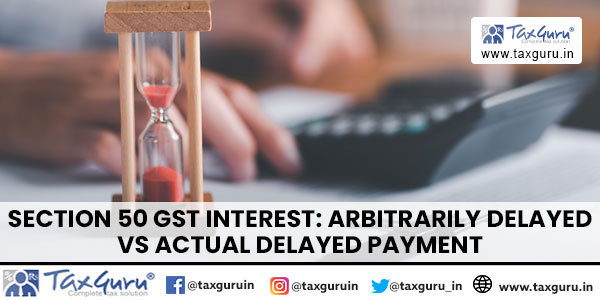Right from the introduction of GST, interest for delayed payment of tax has been a hot topic for discussion. As per the law prevailing at the time of the introduction of GST, interest is levied on the delayed payment/filing of returns irrespective of the credit or cash balance available in the electronic ledger.
Later through Finance Act, 2019, w.e.f. -1st September 2020, the department brought in the change to Section 50 to specifically include a proviso to state that interest will be levied only on that portion of the tax that is paid by debiting the electronic cash ledger.
As the amendment was prospective, numerous representations have been filed to decide on the aspect of interest before the amendment. Considering the challenges faced by the industries in terms of the prospective amendment, the department has further amended the 1st proviso to Section 50 by substituting the proviso in the Finance Act, 2021, dt 28.03.2021 vide Notification No. 16/2021-Central Tax dated 1st June, 2021, w.e.f. 01.07.2017, that the interest will be levied only on that portion of the tax that is paid by debiting the electronic cash ledger.
Hence by all the above amendments the department has made it clear that the interest would be applicable w.e.f. 01.07.2017, only on that portion of the tax that is paid by debiting the electronic cash ledger. In other words, where the registered person has a sufficient credit balance at the time of filing of returns i.e ITC is more than the liability, interest would not be applicable even if there is delayed filing of GST returns.

However, now the question arises what would be the impact on interest if the registered person has sufficient Cash balance in the electronic cash ledger on or before the due date of filing returns?
Vide 53rd GST Council meeting the GST Council has recommended to amend Rule 88B of the CGST Rules, 2017, to provide that an amount that is available in the Electronic Cash Ledger on the due date of filing of return in FORM GSTR-3B, and is debited while filing the said return, shall not be included while calculating interest under section 50 of the CGST Act in respect of delayed filing of the said return.
As per Notification No:12/2024 dt 10/07/2024, proviso to Rule 88B has been inserted as follows:
Provided that where any amount has been credited in the Electronic Cash Ledger as per provisions of sub-section (1) of section 49 on or before the due date of filing the said return, but is debited from the said ledger for payment of tax while filing the said return after the due date, the said amount shall not be taken into consideration while calculating such interest if the said amount is lying in the said ledger from the due date till the date of its debit at the time of filing return.
If we carefully examine the amendment one question that arises is whether the Cash available in the Electronic Cash ledger is equal to the tax paid to the Government.
As per the Proviso to Section 50 interest shall be payable on the portion of tax which is paid in the return by debiting the Electronic Cash Ledger.
As per Section 49(11), the amount transferred in the Electronic Cash ledger would be deemed to be deposited in the said ledger.
As per Section 49(3) read with Rule 61(2), the amount available in Electronic Cash Ledger can be used to discharge his liability towards tax, interest, penalty, fee, or any other amount payable under CGST Act/ CGST Rules, by debiting the Electronic Cash Ledger.
Considering the above provision, it is clear that only after the amount is debited from the electronic Cash ledger, the tax/interest/penalty is deemed to be paid to the Government.
However, now the question arises as to who enjoys the amount available in the Electronic Cash ledger.? Who gets the interest for such a deposit.?
The answer to the above question can help us determine whether the registered person is required to pay interest on those amounts which are already available in the electronic cash ledger.
As per Rule 89(5), where the payment is made by way of National Electronic Fund Transfer or Real Time Gross Settlement, or Immediate Payment Service mode from any bank, the mandate form shall be generated along with the challan on the common portal and the same shall be submitted to the bank from where the payment is to be made.
As per Rule 89(6), on successful credit of the amount to the concerned government account maintained in the authorised bank, a Challan Identification Number shall be generated by the collecting bank and the same shall be indicated in the challan.
From the above provision, it is clear that the amount that gets transferred to the Electronic Cash ledger is already deposited in the Government account, thereby the Government is enjoying the said deposit.
Hence it appears that the intention behind the proposed amendment is very clear that claiming interest again from the registered person to the extent of balance available in the Electronic Cash ledger would amount to double benefit to the Government, as on one end the Government is already enjoying the the deposit made by the registered person and on the other end the Government is levying interest on the delayed debit in the electronic cash ledger. Hence to make it fair to the registered person, the Government has recommended the proposed amendment.
This recommendation is also in line with the recent Madras HC ruling in the case of M/s EICHER MOTORS LTD (2024-TIOL-133-HC-MAD-GST), wherein the Court held that interest will not be applicable to the extent of the amount lying in the Electronic Cash ledger.
Points to Ponder:
Q.1 Impact on account of Prospective amendment?
Ans. As the amendment is prospective, the question that could arise is what would be the impact of interest to the extent of balance available in the Electronic cash ledger, before the amendment?
Considering the intention of the government and the various legal precedents, it can be argued that interest need not be paid even in the case of past cases, where the balance is available in the electronic cash ledger.
Q.2 What would be the impact on interest in case of the amount deposited in the Electronic Cash ledger after the due date of filing the return?
Ans.The amendment states that interest would not be applicable in case of an amount which is available in the electronic cash ledger on the due date of filing the return in Form GSTR-3B.
| Particulars | Due date | Return filing date |
| GSTR-3B | 20-04-2024 | 30-06-2024 |
In case where the amount is transferred to the electronic cash ledger after the due date of filing the return but before actually filing the return, then will the interest apply even to the amount lying in the electronic cash ledger? Let us understand the above through the following scenario:
Scenario 1– Cash deposited in the electronic cash ledger on or before 20-04-2024.
Interest would not be applicable as per the amendment provisions.
Scenario 2- Cash deposited in the electronic cash ledger on 21-04-2024.
As per the amended provision, it appears that interest would be applicable from 20-04-2024 till 30-06-2024. However, considering the intention of the Government, it could still be argued that interest would be applicable only for 1 day i.e. from 20-04-2024 to 21-04-2024.
Scenario 3- Form GSTR-3B filed on 18-04-2024 with a cash liability of Rs.50 Lakhs, however, the actual liability is Rs.5Cr. The balance liability of Rs.4.5 Cr is paid on 19-04-2024. In such a case what would be the impact on interest?
The amendment deals with the only scenario where cash is deposited before the due date and the return is filed after the due date. However, considering the intentions of the Government, it could be argued that interest would not be applicable in such scenarios.
Q.3 Can the amendment be made in the CGST Rules?
Ans.The amendment to ease out the interest burden in case of the amount available in the Electronic Cash ledger came through inserting a sub-rule in Rule 88B of the CGST Rules,2017.
As per the proviso to Section 50, it has been stated that:
Provided that the interest on tax payable in respect of supplies made during a tax period and declared in the return for the said period furnished after the due date in accordance with the provisions of section 39, except where such return is furnished after commencement of any proceedings under section 73 or section 74 in respect of the said period, shall be levied on that portion of the tax that is paid by debiting the electronic cash ledger.
Now the question that arises is Act specifically provides that interest will apply to the extent of the amount debited in the electronic cash ledger. Hence any amendment in the Rules to state that interest would not apply to the extent of balance available in the electronic cash ledger runs contrary to Section 50 of the CGST Act.
Q.4 Can the registered person claim a refund in respect of interest paid earlier, even though the balance was available in the Electronic Cash ledger?
Ans. There is no explicit provision in the GST law that restricts the registered person from claiming a refund. Taking a view that as the amendment is prospective, any interest paid with regard to the delayed filing of the return even though the balance was available in the electronic cash ledger would not be eligible for refund, would become an injustice to the registered person who has properly complied with the GST law. Hence, I am of the view that wherever the registered person has paid interest in respect of the delayed filing of returns, it is suggested to apply for a refund within the due date specified u/s 54 of the CGST Act,2017.
Other Points to ponder:
I. Impact on cash available in the Electronic Cash ledger of the different GSTIN of the registered person.
II. Cash available in the Electronic Cash Ledger under different heads i.e. Penalty, Interest, etc.
The above is only an indicative list and there could be multiple other scenarios, wherein the registered person would be impacted.
Conclusion:
Although the government has made efforts to reduce the interest burden by amending the CGST Rules, 2017, there remain several unresolved ambiguities that the department needs to address. To effectively ease the interest burden on past cases, it is essential for the department to issue clarifications. These clarifications should not only provide relief for historical cases but also offer detailed instructions on how the amended rules can be applied in various other scenarios.





